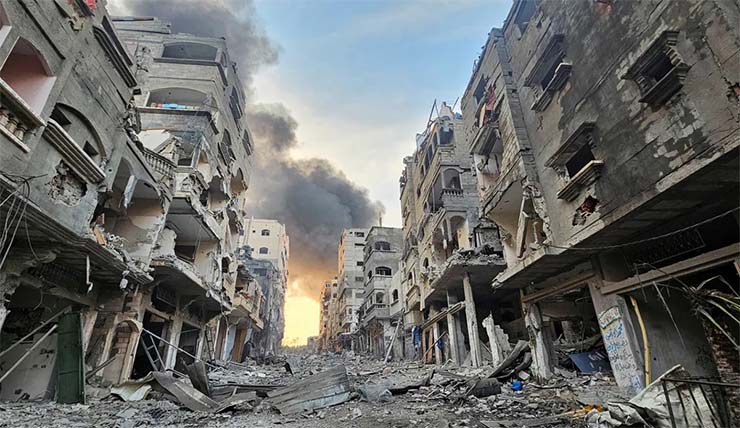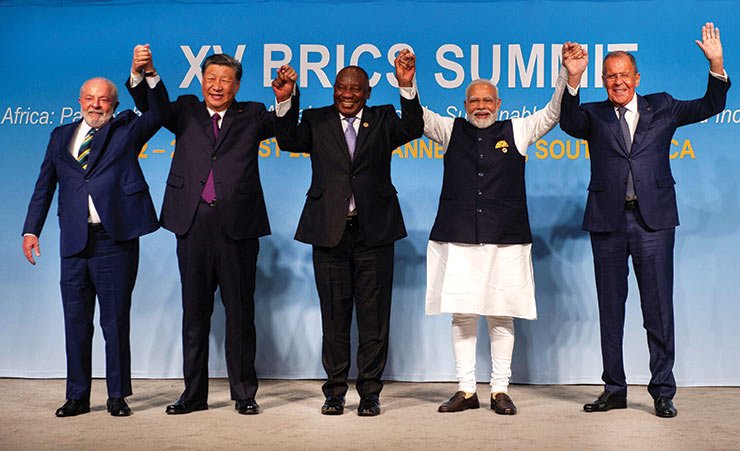
The pursuit of power and the quest to foster peaceful coexistence within humanity fundamentally run parallel, rarely converging. The geopolitical shift from the West to the East has become a defining feature of the global power landscape since the 1990s, with Asia emerging as the main stage for this transformation. The pre-eminence of Asia has thrown up challenges and responsibilities not only for the leading nations of the world but for India as well.
The pillars of diplomacy, defence, counter-terrorism acts, and peacekeeping missions by the UN hinge on strengthening alliances and deepening partnerships with emerging powers. A stable security environment and economic openness constitute the nucleus around which power and humanity revolve, with leadership roles transitioning in the international arena. Geopolitical leadership adheres not only to certain doctrines but implements them in a changing environment, seeking allies, followers, and identifying opponents.
With the West turning inward, the current global order faces threats from a rising power game, creating potential for inter-state conflicts and the infiltration of non-state entities, such as terrorist groups, posing risks to humanity. Responding to this ongoing turmoil, India endeavours to foster a virtuous spirit, aiming for congruence in the international political system.
Balancing Power and Humanity
India stands within the international arena alongside its allies and neighbours, not to infringe upon sovereignty by nullifying others’ rights, but to champion the need to safeguard individual liberties of states. Recent events underscore this imperative. Coordinated attacks by the Palestinian Islamist militant group Hamas from the Gaza Strip onto bordering areas in Israel on October 7, 2023, prompted the United Nations General Assembly to adopt a non-binding resolution calling for a Gaza ceasefire.
The resolution, introduced by Jordan, received 120 votes in favour, 14 against, and 45 abstentions. Notably, it doesn’t mention the Hamas terror group. Key points include an immediate ceasefire, release of civilians, protection of civilians and international institutions, and ensuring the safe passage of humanitarian aid into Gaza. While symbolic, the resolution underscores international support for Palestinians during Israel’s military campaign. India has welcomed global efforts to de-escalate the situation, emphasising its own contributions. Humanity and leadership crises are woven into the international political system, as seen in India’s efforts to de-escalate the war in West Asia.
The demand for stern action against terrorism may not be an assertion of power. However, Israel’s occupation deviates from a logical construction for a peaceful agreement, manifesting a vindictive nature that contradicts the Kantian notion of international peace, emphasising cooperation over conflict for a more intelligible path that humanity should follow.
Sustaining Equilibrium in Global Alliances
Maintaining amicable relations with major powers remains a cornerstone of India’s foreign policy objectives. Active participation in collaborations with the Quad, BRICS, the Shanghai Cooperation Organization (SCO), and various mini-lateral partnerships showcases India’s commitment to balancing its strategic interests in the military and security domains. Simultaneously engaging in military exercises with both the United States and Russia underscores India’s multifaceted approach. Further, participating in security drills and dialogues with immediate neighbours, India deployed a contingent in a multinational exercise held in Russia, reinforcing its dedication to regional security.

Prominent schools of liberalism, socialism, and communism emerge from divergent interpretations of the state’s role in regulating economic matters. While these ideologies inherently involve the study of power and influence, the crux lies in responsible leadership steering changes in the politico-economic mode of production. Social, political, and economic changes are rooted in shifts in the mode of production and exchange, transcending philosophical ideas.
Economic relationships stand as a pivotal thrust area where the convergence of humanity and power shapes a strategic rebalancing. India’s involvement in various trade agreements, such as preferential trade agreements (PTA), free trade agreements (FTA), and Comprehensive Economic Cooperation Agreements (CECA) and Comprehensive Economic Partnership Agreements (CEPA), demonstrates the nation’s emphasis on economic ties in its global strategy. Notably, India concluded negotiations for the Comprehensive Economic Partnership Agreement with the United Arab Emirates in a record 88 days, signalling efficiency in forging economic partnerships.
A Model for Diplomatic Dialogue
India has the opportunity to showcase a spirit of collaboration and openness in managing its tensions with Canada. The recent escalation, stemming from the killing of the Canada-based pro-Khalistan activist Hardeep Singh Nijjar in British Columbia’s Surrey in July, demands a diplomatic approach akin to India’s successful geopolitical strategies. This incident has triggered substantial regional tensions, prompting the need for heightened diplomatic dialogues to address the underlying issues and find a sustainable resolution. In this context, the concept of power assumes paramount importance, emphasizing its role in preserving peace rather than exacerbating instability. By adopting a diplomatic model that prioritizes dialogue, cooperation, and open communication, Indian authorities can work towards de-escalation and understanding, fostering an environment conducive to resolving the tensions effectively. The lessons learned from successful global collaborations can be applied to navigate this specific bilateral challenge, demonstrating India’s commitment to peaceful conflict resolution and regional stability.
India’s strategic interest lies in retaining power through dialogue and mitigating the potential impact of separatist movements at home. Emphasising dialogue, open communication, and diplomatic channels, India can work towards de-escalation and understanding. Learning from its successes in advocating peace and reconciliation in conflicts like Russia-Ukraine and Israel-Hamas, India can prioritise finding common ground and fostering mutual understanding. Engaging in constructive dialogue, showcasing a commitment to conflict resolution, and highlighting shared values can contribute to diffusing tensions and promoting stability in the bilateral relationship with Canada.
–The writer is a professional and experienced writer having worked with multiple organisations. He is a keen observer of global affairs, geopolitics and how it affects the world order. The views expressed are of the writer and do not necessarily reflect the views of Raksha Anirveda















